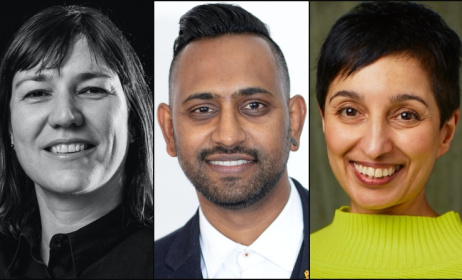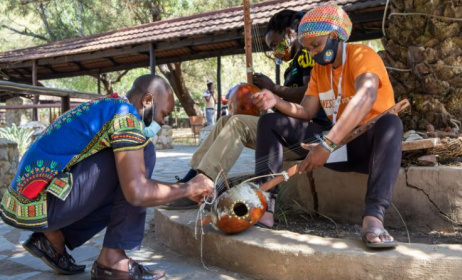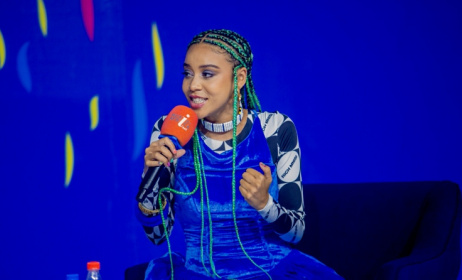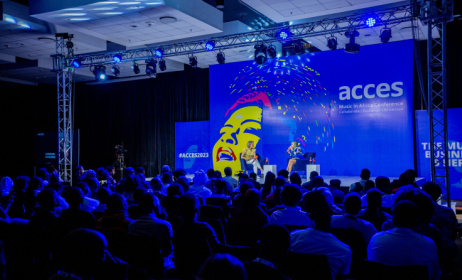Panel discussion: Music as a tool for activism
Prominent musician-activists held a discussion at the Uganda National Museum in Kampala on 3 October.
 Musicians discussing at Your Music Your Voice symposium in Kampala. Photo: KreativeAdikt
Musicians discussing at Your Music Your Voice symposium in Kampala. Photo: KreativeAdikt L-R : Outspoken and Pacy. Photo: KreativeAdikt
L-R : Outspoken and Pacy. Photo: KreativeAdikt
Titled Your Music Your Voice, the discussion centered on the role of music and fame in raising awareness about social issues, as well as the role of social media in respect to freedom of expression. It was organised by Goethe-Zentrum Kampala in partnership with Friedrich-Ebert-Stiftung and supported by Goethe-Institut, Arterial Network and the Music In Africa Foundation.
Such a discussion was long overdue, said Anja Göbel, director of Goethe-Zentrum Kampala. “After Bobi Wine, who has risen to be a symbol of hope for the youth through his socially conscious music joined politics, we felt that it was the right moment to create a platform for African rap activists to meet and network,” she said.
Bobi Wine was present, as were other Ugandan musicians, including Sylvester and Abramz from Break Dance Project Uganda, St Nellysade, female rappers Lady Slyke and MC Yalla. Others who participated were Juma (Kenya), Eric1key (Rwanda), Nash MC (Tanzania), Xuman (Senegal), Monza (Mauritania), Pacy (Burundi) and Outspoken (Zimbabwe).
It was agreed that hip hop and reggae were major genres used for activism.
The government vs the musician
Xuman, co-founder of Journal Rappé, a short weekly TV segment that broadcasts public interest news through hip hop and rap, has been denied airplay, prompting him to play his music on social media platforms.
“The government only funds pro-government musicians," he said. "The rest of us have had propaganda thrown at us by the government which believes that we are being used by the white people to push for their agenda in Senegal. It is true that we are being funded by NGOs but we work with them and not for them.”
Monza told Music In Africa that the government of Mauritania is threatened by hip hop artists because hip hop is the most popular genre of music in the country. Everytime a hip hop concert coincides with a state function, everyone attends the concert, he said. “The government is aware of the influence that the hip hop activist artists have on the people that is why I have been approached several times to join the government. My answer is always no because I know my mission which is to inspire the people to take power and not to take power for myself."
Reggae musician Pacy who has been exiled in Uganda since 2014 said, “I am a refugee because I released songs that targeted those in power and naturally the government does not like to be corrected. I was jailed several times but I decided to relocate to Uganda after receiving numerous death threats."
People vs the musician
The need for public education on music and its role was raised by Nash MC from Tanzania. “Many Tanzanians do not understand my music," he said. "For those that understand, they choose to ignore it...That is why my social conscious songs have very few receivership.”
Eric1key said, “I am from a society that is very conservative and any opinion that seems to not be in line with the government is given no attention. I occasionally get emails and calls from people asking me why I am looking for trouble, I am not looking for trouble they just do not understand what I do.”
Musician now turned politician Bobi Wine openly declared that he is willing to die so that his idea can live on. “In case anyone thinks that if I die my idea will die, they are wrong, if I die there will be 1 000 more Bobi Wines. It is because of this reason that I am multiplying myself in so many young people, through mentorship.”
Should musicians draw a line when it comes to writing about social conscious music? asked Ugandan journalist David Tumusiime.
According to Outspoken from Zimbabwe, self-censorship is important, an artist can still deliver the message in a creative way. “After we realized that there was need for freedom fighters, not street fighters but creative artists that will give voice to the public, we began Magamba network, an award-winning organization which uses creative forms of youth activism with the hope of building a democratic and just Zimbabwe.”
A concert was held the next day, with the musicians performing at Design Hub. German hip hop artist Megaloh and Ghanaian Stallion also performed.
“The artists I had the chance to work with in Kampala showed me that there are so many different ways and forms of using your mind and your voice to fight for freedom and equality," Megaloh said to Music in Africa. "I feel blessed to have connected with these great peaceful warriors, we fight for the same cause.”
As with any event, said Gobel, there were challenges as the organisers “had a bit of a problem with the local authorities when we were trying to get a permit but eventually we succeeded. However, the most nerve-wracking experience was the uncertainty of Bobi Wine's attendance since his home had been attacked with grenades on the day of the symposium. I was glad when he made it.”



























Commentaires
s'identifier or register to post comments